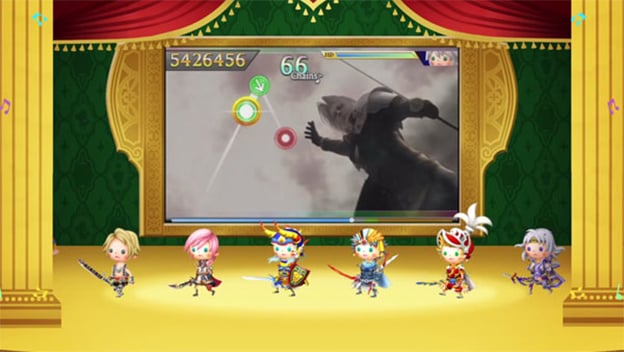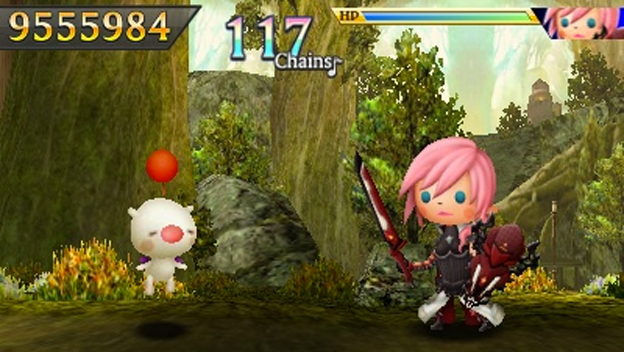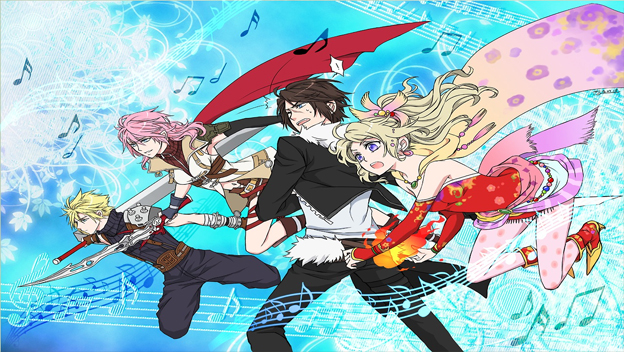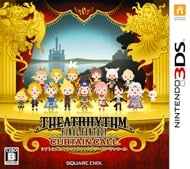Rated T for Tempo
Lightning’s saga is complete and the release of Final Fantasy XV is nowhere in sight. What’s a Final Fantasy fan to do but wallow in the sweet nostalgia of games gone by? On that front, Square Enix is happy to provide, this time with an extended version of 2012’s popular rhythm game titled Theatrhythm Final Fantasy: Curtain Call . With lots more content and some interesting new gameplay modes, Curtain Call does a great job expanding on the original game.
The basics of Theathrythm remain the same here: players are instructed to swipe, hold, and tap to the beat of a wide variety of songs from the Final Fantasy series. This guides a party of adorable doll-like versions of popular series characters through simplified adventures. It’s a simple but effective formula that is enjoyable for rhythm game newcomers and veterans alike, boasting multiple difficulty levels and a nice variety of music. Where Curtain Call comes in is by adding more characters and songs, new features, and some nice improvements to the basic gameplay.
When I say “more characters and songs,” I really mean it. There are over two hundred songs in the base game, and about sixty characters to unlock as you gather rhythmia (the game’s version of your overall score) and crystals by successfully completing songs. Along with new songs from the fourteen main Final Fantasy games, tracks from various spinoffs have been added to the mix. This gives the entire game more variety, from the cinematic tracks found in Final Fantasy VII: Advent Children to the contemporary music in the two Final Fantasy XIII sequels. The extra characters ensure that just about everyone will be able to build a party of favorites and indulge in the time-honored RPG traditions of grinding up levels and tweaking abilities.
Curtain Call ‘s changes go beyond simply adding more stuff, however, as the gameplay and balance have been tweaked. In the original Theatrhythm , the “base” difficulty level was so slow as to inspire mistakes born of boredom. That’s been fixed in Curtain Call , so playing base difficulty songs is a dynamic experience without being overly difficult. This shift has caused the expert level to speed up as well, but in return, it feels like Curtain Call is more permissive with timing. I had an easier time scoring critical hits than I did in the original game, and it always felt fair when I scored a “bad” or “miss” on a note. Swiping with the stylus also felt easier to pull off, and there’s even an option to use the analog stick and buttons instead of (or in addition to) the stylus. This makes completing songs at “ultimate” difficulty less of a chore, since past a certain speed most mortals simply can’t swipe the darn stylus fast enough.

Players can take this improved gameplay into some new game modes. The first is a competitive multiplayer mode that can be played locally or online against friends or strangers. You’ll be attempting to do better than an opponent while playing through the same song, but with a twist. The better you’re doing, the quicker you’ll unleash random challenges against the other player. These can do anything from messing up the speed or movement of the game’s prompts to sucking hit points from your foe. Of course, the same will happen to you, so it’s a contest to see who performs the best under less-than-ideal circumstances. It’s quite fun, and you can even play it against AI characters if you’re tired of being trounced by more rhythmically gifted humans.
Perhaps the most interesting new feature in Curtain Call is the Quest Medley mode. Replacing the “Dark Note” system from the original game, Quest Medleys challenge the party to complete a journey through fields and dungeons, playing multiple songs without completely running out of hit points (which are depleted by missing notes, of course). If the party can make it to the final boss stage and kill the large boss monster (usually the second monster to spawn in the battle mode song), the player is rewarded with items, crystals for unlocking new characters, and a more difficult Quest Medley to attempt. As in Theatrhythm , Quest Medleys are randomized and can be exchanged via StreetPass.

I found Quest Medleys to be rather addictive, with multiple paths increasing replay value and the promise of collectables and other goodies bringing me back for more randomized rhythmic punishment. It is possible to regain hit points by using items between stages, so it’s not a total slog, and the ability to quit and return to a medley at any time makes them portable-friendly. They serve as a nice bridge between this rhythm game and the RPGs that inspired it, and give the player greater incentive to improve and customize the characters in the party.
Despite all its good points, there are a few missed opportunities in Curtain Call . The FMV songs from the original title are missing, likely due to space restrictions, leaving only about ten FMV pieces from the newly added side games. It would have been nice to offer players the chance to import those FMV stages or to download them for free onto a large enough SD card. I would also have liked to see more orchestrated versions of early Final Fantasy songs as an alternative to chiptunes, since there’s a touring Final Fantasy symphony and all. There are a few orchestral and piano remixes scattered through the catalog, but not enough, especially for Final Fantasies I-VI .

In addition, a teensy bit more story might have been nice. The original Theatrhythm had only the barest skeleton of a story, and Curtain Call has even less. It would have been better to remove the two anemic story screens and out-of-place “final boss” fight altogether, but ideally there could have been a bit more effort thrown into a lighthearted story that helped inspire the player to discover all the game’s aspects.
These complaints are rather minor in the grand scheme of things, because Theatrhythm Final Fantasy: Curtain Call is a fantastic tour of the series’ musical history and an entertaining game to boot. It successfully combines the RPG addictions of leveling and customizing characters with the rhythm game addiction of mastering songs. Veterans of the first game and newcomers alike will enjoy its huge catalog of songs and fun features. If you like Final Fantasy and its music, you should absolutely grab a copy of this game.
RATING OUT OF 5 RATING DESCRIPTION 3.5 Graphics
Cute and colorful versions of Final Fantasy characters fit the game’s atmosphere. 4.5 Control
More control options and better-balanced difficulty levels improve on the original Theatrhythm. 5.0 Music / Sound FX / Voice Acting
Even more great music from a wide catalog of Final Fantasy games. 4.5 Play Value
Tons of characters and songs plus fun new features make this a game you’ll keep coming back to. 4.5 Overall Rating – Must Buy
Not an average. See Rating legend below for a final score breakdown.
| Review Rating Legend | |||
|---|---|---|---|
| 0.1 – 1.9 = Avoid | 2.5 – 2.9 = Average | 3.5 – 3.9 = Good | 4.5 – 4.9 = Must Buy |
| 2.0 – 2.4 = Poor | 3.0 – 3.4 = Fair | 4.0 – 4.4 = Great | 5.0 = The Best |
Game Features:
